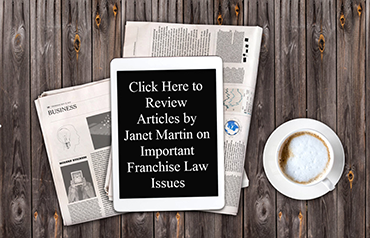Are You Still a Franchisee When the Franchisor Controls Everything?
Whose Business is this, the Franchisee’s or the Franchisor’s
I worked recently with a franchisee client who after telling me everything the Franchisor does as part of their franchise “system”, was wondering if she was even in a franchise as she literally had no control over many of the significant aspects of the operations. She didn’t feel like she was in her own business but felt more like an employee, despite language to the contrary in her franchise agreement.
The Franchised system my client was involved with goes something like this:
- The Franchisor advertises for and finds ALL the customers;
- The Franchisor negotiates all the services and sets all prices with the customer;
- The Franchisor enters into a contract with the customer;
- The Franchisor then offers that contract as is to the Franchisee, take it or leave it.
- The Franchisee takes it and upon arriving at the customer location, sees the actual job is much more involved than as contracted for;
- The Franchisee is required to fulfill the contract, putting in the extra time, resources and product needed to fulfill the contract;
- The Franchisor bills and received payment from the customer directly, and then after deducting its royalties and other fees and payments, sends the Franchisee the balance;
- If there are any customer additional requests or complaints, the customer is told to communicate with the Franchisor.
- The Franchisor controls all aspects of the business, EXCEPT the actual fulfillment of the contract services.
The customer is given a franchisee’s company name, and in this case a representative who is an independent contractor will fulfill the contract.
What’s going on here? Is this a franchise? Whose Business is this anyway?
There are a number of a “franchise” systems that operate exactly this way. And While the Franchise Documentation generally is clear about the Franchisee having control over the operations, the reality is different.
The litigation generally comes up when the Franchisee or customer is either injured or otherwise damaged in the course of performing services, or the Franchisee decides to bring legal action against the Franchisor for unpaid wages as an employer.
Attorneys are utilizing the concept of “Joint Employer Liability” to hold Franchisor’s responsible –as if they were employers– in cases where the Franchisor exerts so much control over the day to day operations of the franchisee’s business such that the lines become blurred as to whose business is this.
This is alarming to Franchisors since the franchise system in fact requires extensive controls to maintain its standards and consistency. However, there is a line that ought not be crosses if the Franchisor wants to maintain a defense against a Joint Employer Liability case. The facts in the above scenario probably cross that line, but each situation is heavily fact dependent.


